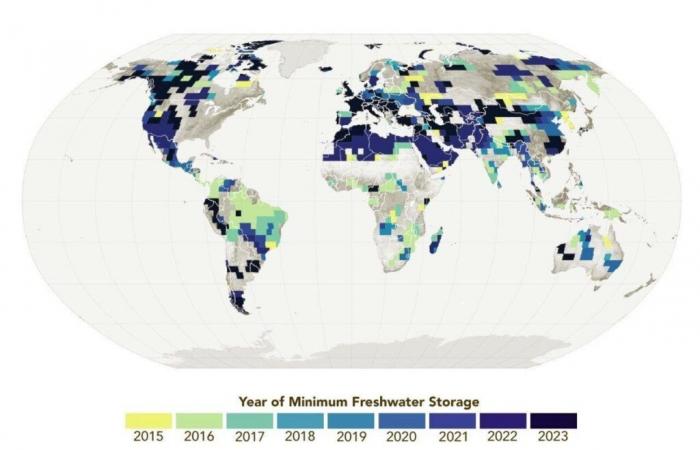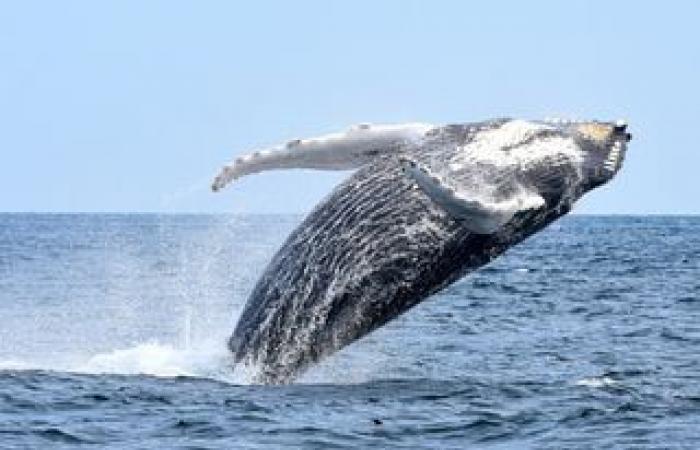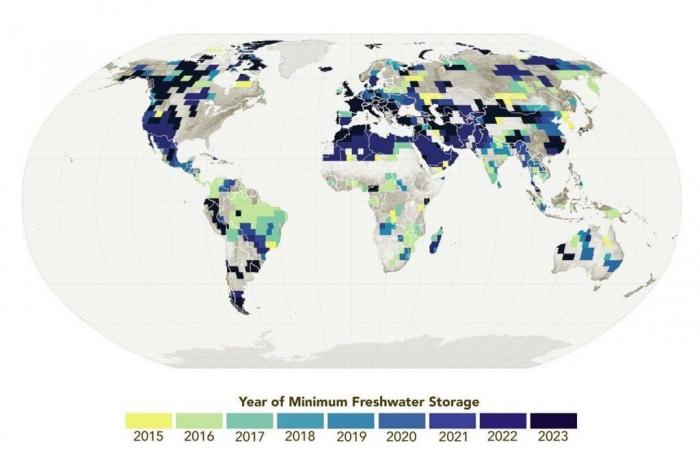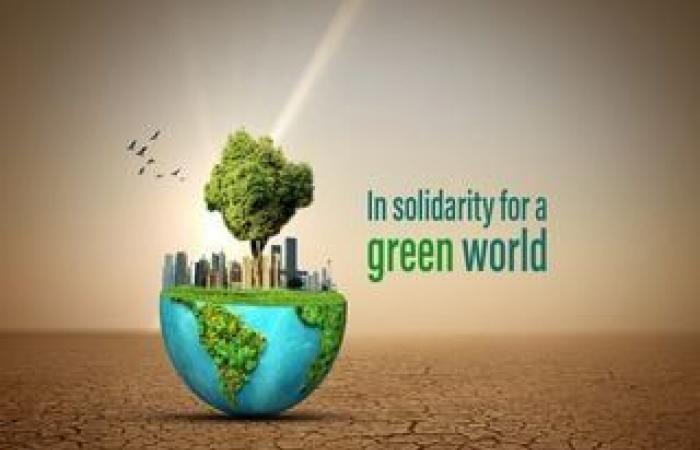An international team of scientists, using observations from German NASA satellites, has found evidence that the total amount of fresh water on Earth declined sharply starting in May 2014 and has remained low ever since. In a report published in Surveys in Geophysicsthe researchers suggested that this change could indicate that the Earth's continents have entered a permanently drier phase.
Results of the study using satellite data
Between 2015 and 2023satellite measurements showed that the average amount of fresh water stored on Earth (which includes liquid surface water such as lakes and rivers, as well as water from underground aquifers) was 1,200 cubic kilometers lower than average levels recorded between 2002 and 2014said Matthew Rodellone of the study's authors and a hydrologist at NASA's Goddard Space Flight Center in Greenbelt, Maryland. “ That's two and a half times the volume lost in Lake Erie.
In times of drought, with the modern expansion of irrigated agriculture, farms and cities must rely more on groundwater, which can lead to a cycle of diminishing groundwater reserves: freshwater supplies run out, rain and snow fail to replenish them, and more groundwater is pumped out.
According to a United Nations report on water stress released in 2024, reduced water availability puts pressure on farmers and communities, which can lead to famine, conflict, poverty and an increased risk of illness when people use contaminated water sources.
The team of researchers identified this sudden decrease in fresh water on a global scale thanks to observations from GRACE satellites (Gravity Recovery and Climate Experiment), operated by the German Aerospace Center, the German Geosciences Research Center and NASA.
GRACE satellites measure fluctuations in Earth's gravity on a monthly scale, revealing changes in water mass above and below the ground. The first GRACE satellites flew from March 2002 to October 2017. The GRACE-Follow On (GRACE-FO) satellites were launched in May 2018.
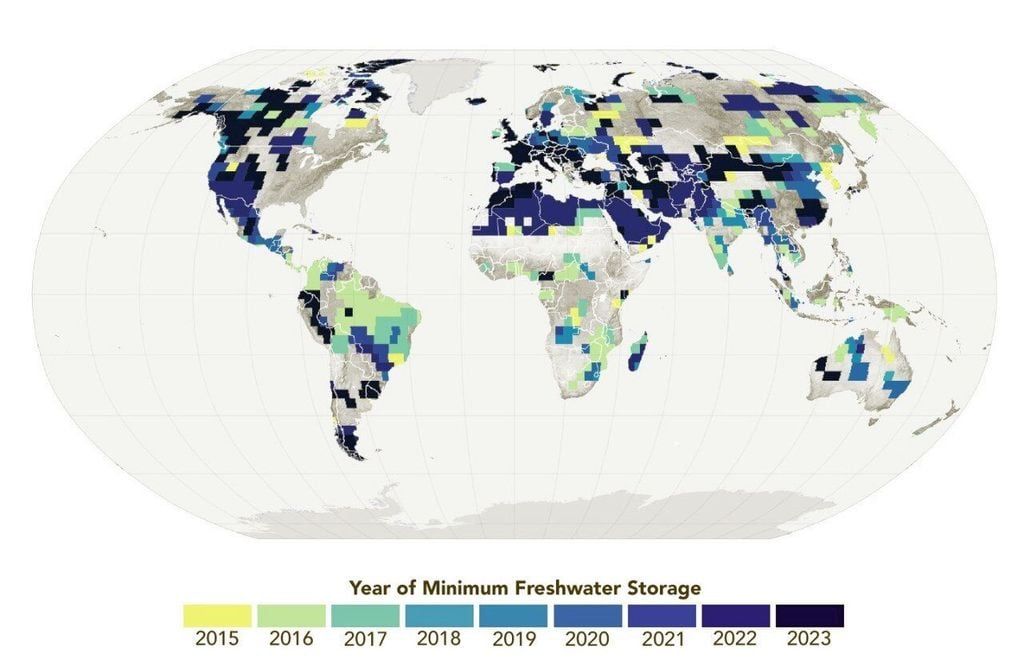
Less fresh water, prolonged droughts and extreme precipitation in a warmer world
The decline in global availability of fresh water reported in the study began with a severe drought in northern and central Brazilfollowed shortly after by a series of major droughts in Australasia, South America, North America, Europe and Africa. Rising ocean temperatures in the tropical Pacific late 2014 to 2016, which culminated in one of the strongest El Niño events since 1950, led to changes in atmospheric jet streams which have changed weather conditions and precipitation around the world.
However, even after El Niño disappeared, global fresh water did not recover. In fact, Rodell and his team report that 13 of the 30 most intense droughts observed by GRACE have occurred since January 2015.
Rodell and his colleagues believe that global warming could contribute to the persistent depletion of fresh water.
According to the meteorologist Mikhail Bosilovichfrom NASA's Goddard Center, the Global warming causes the atmosphere to hold more water vapor, resulting in more extreme precipitation. While annual precipitation and snowfall do not change dramatically, prolonged periods between heavy precipitation events allow the soil to dry out and compact. This reduces the amount of water the ground can absorb when it rains.
“The problem of extreme precipitationexplained Mr. Bosilovich, is that the water ends up flowing instead of being absorbed and replenishing groundwater reserves.”
Globally, freshwater levels have remained consistently low since the 2014-2016 El Niño event, while more water remains trapped in the atmosphere as water vapor.
“Rising temperatures increase both the evaporation of surface water into the atmosphere and the water-holding capacity of the atmosphere, increasing the frequency and intensity of drought conditions.”
Uncertain climate measurements
Although there are reasons to believe that the sudden fall of fresh water is largely due to global warming, it may be difficult to establish a definitive link between the two factorssaid Susanna Wertha hydrologist and remote sensing specialist at Virginia Tech, who was not involved in the study.
“Climate forecasts are uncertain ” said Mr. Werth. “ Measurements and models are always imperfect.”
It remains to be seen whether global fresh water will return to pre-2015 levels, remain stable, or resume its decline. Given that the nine hottest years in modern temperature history coincided with the sharp decline in fresh water, Mr Rodell said: “ We don't think this is a coincidence, and it could be a harbinger of things to come.
Article reference:
Matthew Rodell et al, An Abrupt Decline in Global Terrestrial Water Storage and Its Relationship with Sea Level Change, Surveys in Geophysics (2024). DOI: 10.1007/s10712-024-09860-w

